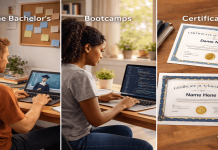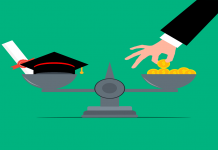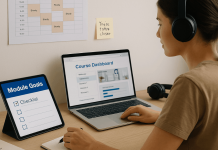What is the purpose of education for students? How does it shape their future and empower them to reach their full potential?
Education is more than just gaining knowledge; it’s about developing the skills and abilities necessary for success in the modern world. It equips students with the tools to think critically, make informed decisions and become active and responsible members of society.
Through education, students gain access to various knowledge and skills in multiple subjects, from math and science to literature and social studies. Furthermore, education helps students to understand and appreciate diverse perspectives and cultures, promoting tolerance and empathy.
Are you ready to unlock your full potential and shape your future through the power of education? Discover the true purpose of education and how it empowers students to reach their goals and aspirations.
The Comprehensive Purpose of Education
The general purpose of education can be summarized in the following points:
- To provide individuals with a broad range of knowledge and skills in various subjects, from math and science to literature and social studies.
- To help students think critically, make informed decisions, and become active and responsible members of society.
- To promote understanding and appreciation of diverse perspectives and cultures, fostering tolerance and empathy.
- To enable students to be lifelong learners and to continue to grow and develop throughout their lives.
- To prepare students for the workforce by developing problem-solving, communication, and teamwork skills.
- To provide students with the tools to set and achieve personal and professional goals and become community members.
- To promote innovation and create a better future for all.
- To bridge the socio-economic divide and provide equal opportunities to all.
- To foster creativity, curiosity, and the ability to learn and adapt.
- To equip students with emotional intelligence and social skills.
- To aid in personal fulfillment and overall well-being.
In short, education plays a crucial role in shaping students’ futures by equipping them with the knowledge, skills, and abilities necessary for success in the modern world, fostering critical thinking and responsible citizenship, and enabling them to become lifelong learners.
Preparing Students for Success in the 21st Century: The Goal of Schooling
The purpose of schooling in the 21st century is to prepare students for success in a rapidly changing, complex, and globalized world. It includes providing students with a comprehensive education that focuses on core academic subjects and incorporates skills such as critical thinking, problem-solving, creativity, communication, digital literacy, and collaboration.
Schooling in the 21st century should also aim to develop well-rounded individuals who can think critically and make informed decisions, appreciate and understand different perspectives and cultures, and take an active role in their community and society.
Another important aspect of schooling in the 21st century is to prepare students for the future by teaching them skills such as adaptability and the ability to continuously learn and grow.
In addition, 21st-century schooling should strive to provide equal opportunities for all students regardless of their socio-economic background and to bridge the gap between different groups by providing an inclusive and respectful learning environment.
Overall, schooling in the 21st century aims to empower students with the knowledge, skills, and attitudes necessary for success in a rapidly changing world and to equip them with the tools to navigate the challenges of the future.
Education and the Development of Critical Thinking and Problem-Solving Skills for Today’s Job Market
Education plays a critical role in developing learners’ critical thinking and problem-solving skills in today’s job market. Through education, students are exposed to various knowledge and skills in multiple subjects, from math and science to literature and social studies. It helps them think critically and make informed decisions by analyzing and evaluating information and considering multiple perspectives.
In addition, education allows students to engage in problem-solving through hands-on learning experiences, group projects, and real-world scenarios. It helps them to develop the ability to identify and analyze problems, generate solutions, and evaluate the effectiveness of their solutions.
Furthermore, education encourages the development of critical thinking and problem-solving skills by providing opportunities to engage in independent and self-directed learning. It enables individuals to take ownership of their learning and to apply their knowledge and skills in different contexts.
The Importance of a Well-Rounded Education: Understanding Diverse Perspectives and Cultures in Achieving Success in Life
In today’s job market, critical thinking and problem-solving skills are highly valued by employers. These skills are essential for success in a wide range of fields, including business, technology, healthcare, and the creative industries. Therefore, education plays a crucial role in developing these skills and preparing students for success in the job market.
The purpose of education in life is to basically provide students with the knowledge and skills needed to navigate the world around them. A well-rounded education, which includes exposure to diverse perspectives and cultures, is essential for this purpose. It helps individuals develop the ability to think critically, understand different viewpoints, and engage with people from all walks of life. This knowledge and understanding can help learners make informed decisions, build strong relationships, and contribute to the betterment of their communities.
Furthermore, exposure to diverse perspectives and cultures can broaden students’ understanding of the world, leading to greater empathy and compassion. It can also help individuals recognize and challenge their own biases and prejudices, allowing them to interact with people from different backgrounds in a more respectful and understanding way.
Additionally, understanding and appreciation of different cultures are becoming increasingly important for personal and professional success in a globalized world. A well-rounded education that includes exposure to diverse perspectives and cultures provides individuals with the skills they need to thrive in an interconnected world.
Empowering Future Citizens: How Education Helps Students Become Responsible and Active Members of Society
Education plays a vital role in helping students become responsible and active citizens. It provides students with the knowledge, skills, and values they need to understand and participate in civic life.
The curriculum teaches students about the political, economic, and social systems that shape their communities and the larger world. They also learn about their rights and responsibilities as citizens. Students can make informed decisions about participating and contributing to the community by understanding these systems and their role in society.
Additionally, education provides students with the skills and knowledge necessary for effective participation in civic life. Critical thinking, problem-solving, and effective communication are skills developed through education, essential for active social participation.
Furthermore, education promotes understanding and respect for different cultures and perspectives. It is essential for fostering mutual respect and learning in a diverse society. It also helps students recognize and challenge their biases and prejudices, leading to more inclusive and equitable communities.
In summary, education is crucial in preparing students to become responsible and active citizens. It provides students with the knowledge, skills, and values they need to understand and participate in civic life and promote social change and the common good.
Building Emotional Intelligence and Social Skills: How Education Equips Students for Success
Education plays an important role in society by equipping students with emotional intelligence and social skills. Emotional intelligence refers to the ability to recognize, understand, and manage one’s own emotions and the emotions of others. Social skills, however, refer to the ability to interact and communicate effectively with others.
Through the curriculum and various educational experiences, students learn about emotions, empathy, and the importance of positive relationships. They also learn how to identify and express their feelings, as well as how to respond to the emotions of others.
Additionally, education provides opportunities for students to practice and develop social skills through group activities, discussions, and other forms of collaborative learning.
Furthermore, the purpose of teaching is to provide opportunities for students to learn about and practice different forms of communication, such as verbal and nonverbal communication, active listening, and conflict resolution. These skills are essential for building positive relationships and working effectively with others.
In summary, education equips students with emotional intelligence and social skills by teaching them about emotions, empathy, and the importance of positive relationships, providing opportunities for them to practice and develop social skills, and teaching them the communication skills needed to interact effectively with others.
Education for Personal Fulfillment and Overall Well-being: The Importance of Learning beyond Career and Civic Success
The purpose of education is to provide students with the knowledge and skills needed to navigate the world around them. Education is essential for success in career and civic life and plays a crucial role in personal fulfillment and overall well-being.
Education can help individuals develop their talents and interests and discover their passions. It can also provide learners with the knowledge and skills needed to pursue their goals and aspirations. Furthermore, education can also offer opportunities for personal growth, self-discovery, and self-expression.
Education can also improve well-being by promoting physical, emotional, and mental health. By learning about health and wellness, students can make informed decisions about caring for their bodies and minds. Additionally, education also teaches individuals how to cope with stress and manage their emotions.
In summary, education is essential for success in career and civic life and plays a crucial role in personal fulfillment and overall well-being. The purpose of education is to provide individuals with the knowledge, skills, and opportunities to pursue their goals, passions, and aspirations while promoting their physical, emotional, and mental health.
Fueling Progress: The Importance of Education in Fostering Innovation and Building a Better Future
Education is crucial in fostering innovation and creating a better future for all. Through education, students gain the knowledge, skills, and abilities necessary to think critically, solve problems, and create new ideas. These are essential skills for innovation and are vital for individuals contributing to society’s advancement.
Education provides access to new information and technologies, which can be used to create new products, services, and processes. It also allows individuals to think creatively and find new ways of doing things. It is essential for driving innovation and creating new solutions to old problems.
Moreover, education encourages individuals to be curious and to ask questions, which is an essential aspect of innovation. It also teaches individuals to think independently and to challenge existing ways of doing things. It is necessary to foster innovation, as it encourages individuals to think outside the box and create new ideas.
Furthermore, education plays a crucial role in creating a more equitable and inclusive society by providing individuals from all backgrounds with the knowledge, skills, and abilities necessary to succeed regardless of their socio-economic background. It is essential for creating a better future for all, as it helps to break down barriers and promotes social mobility.
In short, education is a powerful tool for fostering innovation and creating a better future for all. It provides individuals with the knowledge, skills, and abilities necessary to think critically, solve problems, and create new ideas, which are essential for driving innovation and advancing society.
Bridging the Socio-Economic Divide: The Power of Quality Education
Access to quality education is one of the most potent tools for bridging the socioeconomic divide and creating a more just and equitable society. Education is the key to unlocking one’s full potential and providing individuals from disadvantaged backgrounds with the skills and knowledge necessary to succeed in the workforce.
Imagine a world where every child has the same educational resources and opportunities regardless of background; where textbooks, technology, and qualified teachers are readily available to all; and where programs and support services are in place to address non-academic barriers to success, such as poverty and lack of parental involvement.
It is not just a pipe dream but a real and achievable goal. Policies such as affirmative action and need-based financial aid are already in place to help level the playing field and ensure that individuals from disadvantaged backgrounds have an equal opportunity to access and succeed in higher education.
But we can and should do more. Investing in education and implementing policies that promote equity and inclusion can break down the barriers that have held back generations of individuals from disadvantaged backgrounds and create a more just and equitable society for all.
So let us take a stand and commit ourselves to providing every child with access to quality education, so they can unlock their full potential and build a brighter future for themselves, their families, and our society.
The Impact of Technology and Digital Literacy on the Modern Education System
Technology and digital literacy have significantly impacted the modern education system. One of the main ways technology has impacted education is through online learning platforms and remote learning tools, which have made education more accessible and flexible.
Additionally, technology has made it easier for educators to create and share engaging and interactive content, such as videos, animations, and simulations. It has made learning more engaging and interactive for students and allowed educators to customize their instruction better to meet the needs of individual students.
Furthermore, technology has also enabled collaboration and communication among students and teachers, which can enhance the learning experience.
However, digital literacy is also essential to education in the digital age. It equips students with the knowledge and skills they need to navigate and use technology effectively. It includes understanding how to use software and digital tools, evaluate and use online information, and use technology to communicate and collaborate with others.
In summary, technology and digital literacy have greatly enhanced the modern education system by making education more accessible, interactive, and personalized. Still, also it is essential to ensure that students are equipped with the skills they need to use technology effectively.
The Impact of Curriculum on Education: How the Selection of Content, Teaching Methods, and Assessment Shape Student Learning
The curriculum determines what students will learn, how they will know, and how they will be assessed. The curriculum’s selection of content, teaching methods, and assessment affect the quality of education and the way students learn.
A well-designed curriculum aligned with students’ needs and abilities can positively impact education by providing students with a solid foundation of knowledge and skills. It can also motivate and engage students, fostering a love of learning. On the other hand, a well-designed curriculum can help student learning and lead to disengagement.
Additionally, the curriculum also plays a role in shaping the culture of a school. An inclusive and reflective curriculum of students’ diverse backgrounds and experiences can promote a positive school culture and create a more equitable learning environment.
In summary, the curriculum is a crucial aspect of education as it sets the foundation for what students will learn and how they will learn it. It also plays a role in shaping the culture of a school and affects the quality of education and the way students learn.
Building a Brighter Future: The Power of Education in Transforming Students’ Lives
The purpose of education for students is to equip them with the skills and knowledge necessary to succeed. Education is not just about memorizing facts and figures but about developing critical thinking skills, creativity, and problem-solving abilities. It is about learning how to learn and applying that learning to real-world situations.
An excellent education is necessary for students to develop the competencies required for the 21st century, whether that be in their personal or professional lives. It is a powerful tool that can help individuals break free from the constraints of their socioeconomic background and open doors to new opportunities. It is the foundation upon which individuals can build a better future for themselves and their families.
Quality education is a fundamental right and a basic human need; it helps people to develop their full potential and improve their quality of life. It is the key to unlocking the potential of future generations and building a more just, equitable, and prosperous society for all.










